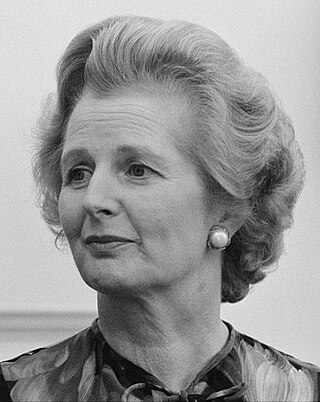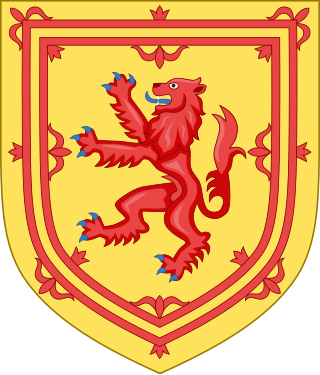
The 1979 United Kingdom general election was held on Thursday 3 May 1979 to elect 635 members to the House of Commons.

The politics of Scotland operate within the constitution of the United Kingdom, of which Scotland is a country. Scotland is a democracy, being represented in both the Scottish Parliament and the Parliament of the United Kingdom since the Scotland Act 1998. Most executive power is exercised by the Scottish Government, led by the First Minister of Scotland, the head of government in a multi-party system. The judiciary of Scotland, dealing with Scots law, is independent of the legislature and the Scottish Government. Scots law is primarily determined by the Scottish Parliament. The Scottish Government shares some executive powers with the Government of the United Kingdom's Scotland Office, a British government department led by the Secretary of State for Scotland.

Scotland has elections to several bodies: the Scottish Parliament, the United Kingdom Parliament, local councils and community councils. Before the United Kingdom left the European Union, Scotland elected members to the European Parliament.

The 2011 Scottish Parliament election was held on Thursday, 5 May 2011 to elect 129 members to the Scottish Parliament.

The 2007 Scottish Parliament election was held on Thursday 3 May 2007 to elect members to the Scottish Parliament. It was the third general election to the devolved Scottish Parliament since it was created in 1999. Local elections in Scotland fell on the same day.
The 1978 Glasgow Garscadden by-election was a parliamentary by-election held on 13 April 1978 for the British House of Commons constituency of Glasgow Garscadden, in the north west periphery of the City of Glasgow.
The 1978 Berwick and East Lothian by-election was a by-election held for the House of Commons constituency of Berwick and East Lothian in Scotland on 26 October 1978. It was one of two UK parliamentary by-elections held on that day, and was won by the Labour Party candidate John Home Robertson.

The 2012 Scottish local elections were held on 3 May 2012 in all 32 local authorities. The Scottish National Party (SNP) overtook Labour to win the highest share of the vote, and retained and strengthened its position as the party with most councillors. Labour also made gains, while the Liberal Democrats experienced meltdown, losing over half their seats and falling behind the Conservatives. For the first time since the introduction of the Single Transferable Vote system, the SNP won majority control of 2 councils, from no overall control. Labour also won majority control of 2 councils from no overall control, while retaining majority control over 2 councils.

Local elections were held in Scotland on 7 May 1992, to elect members to all 53 district councils. It was the last local election held under the Local Government (Scotland) Act 1973, which had established the two-tier system of regions and districts. Regional and district councils were abolished in 1996, and replaced with 29 new mainland unitary authorities under the terms of the Local Government etc. (Scotland) Act 1994.

Elections for the Scottish district councils were held in 1980.

Elections to Strathclyde Regional Council were held on Thursday 6 May 1982, on the same day as the eight other Scottish regional elections. This was the third election to the regional council following the local government reforms in the 1970s.

The 2017 Scottish local elections were held on Thursday 4 May, in all 32 local authorities. The SNP retained its position as the largest party in terms of votes and councillors, despite suffering minor losses. The Conservatives made gains and displaced Labour as the second largest party, while the Liberal Democrats suffered a net loss of councillors despite increasing their share of the vote. Minor parties and independents polled well; and independent councillors retained majority control over the three island councils. For the first time since the local government reforms in 1995, all mainland councils fell under no overall control.

A general election was held in the United Kingdom on 7 May 2015 and all 59 seats in Scotland were contested under the first-past-the-post, single-member district electoral system. Unlike the 2010 general election, where no seats changed party, the Scottish National Party (SNP) won all but three seats in Scotland in an unprecedented landslide victory, gaining a total of 56 seats and taking the largest share of the Scottish vote in sixty years, at approximately 50 per cent. The Labour Party suffered its worst ever election defeat in Scotland, losing 40 of the 41 seats it was defending, including the seats of Scottish Labour leader Jim Murphy and the then Shadow Foreign Secretary Douglas Alexander. The Liberal Democrats lost ten of the eleven seats they were defending, with the then Chief Secretary to the Treasury Danny Alexander and former leader Charles Kennedy losing their seats. The election also saw the worst performance by the Scottish Conservative Party, which received its lowest share of the vote since its creation in 1965, although it retained the one seat that it previously held. In all, 50 of the 59 seats changed party, 49 of them being won by first-time MPs.
Scottish local elections were held in 1967 to elect members to the various Corporations, Burghs, and County Boards of Scotland.
Elections for the City of Edinburgh District Council took place on 3 May 1977, alongside elections to the councils of Scotland's various other districts. These were the second election to the City of Edinburgh District Council. Conservatives won a majority with 34 of the Council's 64 seats. Across Scotland the elections saw the Conservatives and SNP make gains, while Labour lost seats. The Glasgow Herald said the Conservatives gaining control of Edinburgh District Council "crowned" what was "a night of considerable success" for the party.
Elections to Strathclyde Regional Council were held on Tuesday 2 May 1978, on the same day as the eight other Scottish regional elections. This was the second election to the regional council following the local government reforms in 1974.
The sixth and last election to Tayside Regional Council was held on 5 May 1994 as part of the wider 1994 Scottish regional elections. The election saw the Scottish National Party overtaking Labour to become the council's largest party, and following the election the SNP formed a minority administration. The Conservatives lost 10 seats and became the third largest party. 8 weeks later, leader of the council Lena Graham resigned 'for personal reasons' and Ewan Dow took over as council leader.
The 1980 City of Glasgow District Council election took place on 1 May 1980, alongside elections to the councils of Scotland's various other districts. This was the third election to the City of Glasgow District Council.

Elections to Fife Council were held on 4 May 2017, the same day as the other Scottish local government elections. The election used the 22 wards created as a result of the Local Government Commission for Scotland's 5th review which was published in September 2016, with each ward electing three or four councillors using the single transferable vote system form of proportional representation, with 75 councillors elected; a decrease of three seats from 2012 as one ward, The Lochs, was abolished.

A general election was held in the United Kingdom on Thursday 8 June 2017; all 59 seats in Scotland were contested under the first-past-the-post electoral system.













